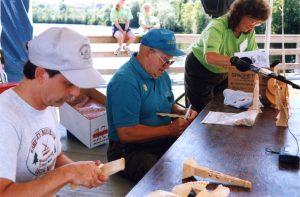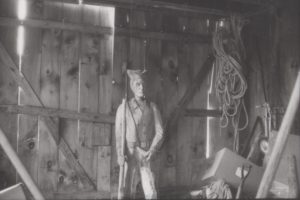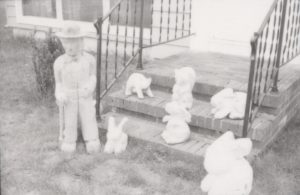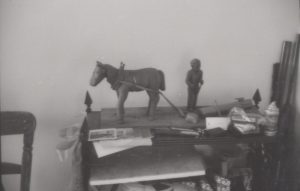Rangeley, “The Mad Whittler”
Poem: “The Mad Whittler”
Poet: Gaylon “Jeep” Wilcox
ID: NA1582
Donated by Jeep Wilcox on September 29, 2011.

“The Mad Whittler” is about Rangeley’s former dump, which may not sound like a traditional subject for poetry. The dump was, before being closed, a major attraction where people from all over gathered to watch bears forage (a popular pastime in rural Maine and any other places where there are bears and garbage). In the poem, Rodney Richard, Sr. (aka “The Mad Whittler”) volunteers to whittle decoys to attract bears to maintain Rangeley’s tourism industry, which includes much more than just the dump. He accomplishes his goal by turning every tree in the forest into a bear decoy. According to Jeep Wilcox, whose poetry covers some experiences or events that are true, some that are not quite true, and some that are not true at all, this falls into the middle category. The dump, bears, and Mad Whittler are (or were in the case of the dump) real, and concern over a shortage of bears may have existed at some point as well. Moreover, as will be discussed later, the Mad Whittler is even known to carve bears and other animals out of wood. But did he actually whittle every tree in the Rangeley area into a bear decoy? Well, we all need to visit Rangeley to find out for ourselves.

The main character in the poem is Rodney Richard, Sr., a wood carver from a family of wood carvers. Rodney, Sr. (born 11.13.1929) worked as a logger and built roads, driveways, and septic systems in the summer. He began carving at a young age whenever he wanted a toy. As an adult he has carved a wide array of items: sets of logger figures, animals (best known are his tiny rabbits, he has carved over twenty-thousand which are all over the world), a life-sized Native American figure for a doughnut shop in Rangeley, and more recently he took up carving fan towers like his father. Rodney mostly whittles with a knife, but has been known to carve with chainsaws and other tools on larger items (such as bear sculptures). The first generation in the Richard family of carvers was Rodney’s father, William Richard (1900-1993). Born in Rogersville, NB, William moved to Maine on January 1, 1921, where he worked as a logger. William started carving before he moved to Maine and while in the woods he carved tool handles, made spruce gum books (little boxes that held spruce gum) for himself and others, and whittled peach pits into various objects (a very difficult task because they are a hard material). He became best known for his fan towers, which he learned to carve from Raymond Bolduc while they both served a few months in jail for bootlegging in the 1920s. The third generation of wood carvers is Rodney “Butch” Richard, Jr. (born 3/10/1955), also known as “The Maine Woods Whittler.” Butch took up carving in high school when he started carving wooden chains. He began carving on a regular basis after folklorist Peggy Yocom came to Orono, where Butch was attending college at the time, and began researching the Richard family and their carving tradition. Butch has since branched out into various other styles like his father and grandfather.

As mentioned earlier, the Richards are known for their fan towers. These towers are a popular art form among loggers in Northern Maine and Southern Canada. The form moved West with Maine loggers to Michigan, Minnesota, and Oregon. The Richards, however, produce a double fan style that is unique to the Richard family and Raymond Bolduc. Peggy Yocom, who has studied these fans intensively, has not seen them by other craftspeople in US. Fan towers are also found around the world in Russia, Norway, Sweden, Czech Republic, Slovakia, Switzerland, and France. It is thus of little surprise that fan tower carving became a popular art form in Northern Maine. Most of the carvings done by any of the Richards utilized pine, though they have all used different types of wood depending on the needs of each piece. However, the fans are made exclusively of white cedar because it does not split easily, even when carved into very thin strips.

The Mad Whittler by Jeep Wilcox
The Legion Hall was full, that night in town,
A discussion on bears, the population was down.
Business folk from town and the Chamber of Commerce
All agreed the situation couldn’t be worse.
For to watch the bears was a “drawing” event,
Which a lot of tourist dollars each years was spent.
Sportsmen and Guides, they were concerned too,
For without lots of bears, what would they do?
When up spoke Rodney, being slightly amused,
“To attract something, a good decoy is used.
Now you folks don’t worry, I have a plan
That will give us more bears, if anything can.”
He whittled all night; he whittled all day,
He whittled Saddleback nearly all away.
When he finished, the results were good,
One decoy, where every tree had stood.
And one month later, as the sun went down
Bears were still coming from miles around.
Three cheers for Rodney, he deserves a hand
For bringing back the bears, all over our land.
We should whittle out a Rodney, erect it in a park
Surround it by lights, to be seen in the dark.
At his feet we should carve this sign –
“Rodney the Mad Whittler, A Legend in His Time.”
Sources: Rodney Richard, Sr. founded and Peggy Yocom curates the Maine Forestry Museum, formerly Rangeley Lakes Region Logging Museum. To read more about the Richard family of wood carvers: Yocom, Margaret. “‘If we don’t joke with each other, we won’t have no fun, will we?’ Storytelling in the Richard Family of Rangeley, Maine,” in MacDonald, Margaret Read, ed. Traditional Storytelling Today. Chicago: Fitzroy Dearborn, 1999, 416-27 & “Exuberance in Control: The Dialogue of Ideas in the Tales and Fan Towers of Woodsman William Richard of Phillips, Maine,” in MacDougall, Pauleena and David Taylor, eds. Northeast Folklore: Essays in Honor of Edward D. Ives, Orono: University of Maine Press, 2000, 265-95. For more on Jeep Wilcox: Yocom, Margaret and Gaylon Wilcox. “‘Just call me Sandy, son’: Poet Jeep Wilcox’s tribute to Sandy Ives.” in MacDougall, Pauleena and David Taylor, eds. Northeast Folklore: Essays in Honor of Edward D. Ives, Orono: University of Maine Press, 2000, 405-14.
